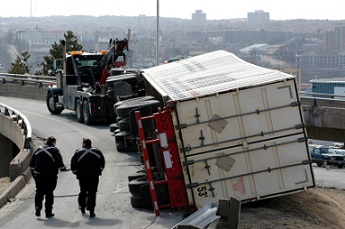Truck accidents can be devastating for your health and personal property. Following a truck accident, timing is critical for ensuring that you get the help you need to recover from your injuries. While attending to your medical needs should always take priority over everything else, there are several important things to do in the minutes and days after your accident. From finding the right attorney to documenting the accident, here is a step-by-step guide for what to do after a truck accident.
Seek Medical Attention for Your Injuries
The injuries sustained in a truck accident can be life-threatening. Whether your injuries are minor scratches or are serious does not matter; it is important to seek medical attention immediately. Not only will this help contribute to a better long-term prognosis, but documenting your injuries can also be helpful if you must file a lawsuit. Additionally, hold onto any receipts, bills and other financial documents that you receive for your medical care. If your injuries are visible, then be sure to take photographs of each injury to prove your need for medical care.
Take Pictures of the Scene
If your truck accident occurred on a busy road, then it will quickly be cleaned up so as to not impede traffic. If possible, begin taking pictures of the scene immediately, or request an investigator to do so. After an accident, details can quickly become fuzzy or can be fabricated by the person who is at fault. If your case goes to a court trial, then having pictures that demonstrate who was at fault can be crucial for getting fair compensation. When taking pictures, be sure to get a picture from several different angles and include road signs and landmarks in the images. These can be very valuable later if your case is presented to a jury.
Launch an Independent Investigation
Although the local police department may begin to investigate the accident immediately, you will need to launch an independent investigation that can provide further insight into how the accident occurred. An investigator can work with your lawyer to gather evidence that points to who was at fault. They can provide proof of what speed each vehicle was traveling at, when the brakes were applied and if the guilty party was engaged in negligent behavior.
Hold onto All Evidence
When filing a truck accident claim, even trivial items may be important for the investigation. After the accident, many people throw away important evidence such as tattered clothing and broken cell phones. Even something as simple as a broken side-view mirror could be critical for proving your case. Therefore, hold onto anything that may later be used as evidence during the investigation and resulting trial. If you are not sure if something could be important, then ask your attorney. One with experience in truck accidents should be able to help you decide what items you should hold onto after the accident.
Consult with Your Attorney
Immediately after the accident, you may be pressed by insurance companies, other investigators or the other person in the accident to sign papers or admit fault. Even if you think you might be at fault, you should never admit fault without a licensed truck accident attorney present. Additionally, it is important to avoid signing any papers that you may not understand without the advice of your lawyer. Too often, insurance agencies are willing to use unscrupulous tactics to lower the cost of a claim. In court, your recorded statement could be used against you and could cause you to lose your case.
Although a truck accident can be devastating physically and emotionally, there are many things you can do to alleviate some of your suffering while also protecting your rights. After you have attended to your medical needs, one of the first steps you should take is contacting an attorney that can guide you through the rest of the process for filing your lawsuit. Then, they can help you launch an independent investigation that provides documentation of the actions that led up to the accident. If your case goes to trial, then your attorney will play a critical role in negotiating with the insurance company and other associated parties so that you can receive the compensation you need for a positive recovery.
